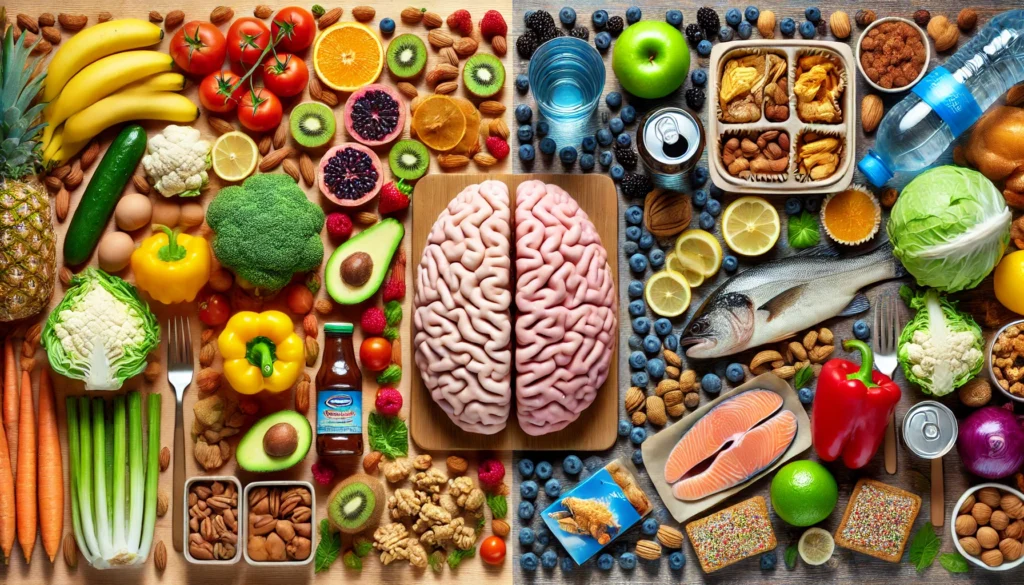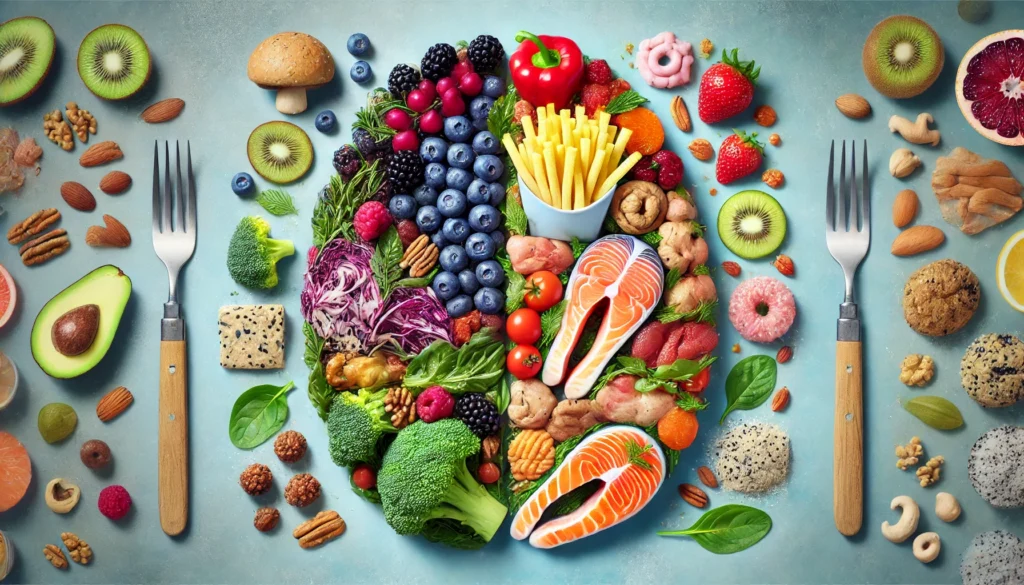Introduction: The Role of Nutrition in Brain Health
The human brain is a complex organ that requires a variety of nutrients to function optimally. As research in neuroscience and nutrition advances, it is becoming increasingly clear that what we eat plays a significant role in cognitive function, memory retention, and the prevention of neurodegenerative diseases such as Alzheimer’s and dementia. Understanding the relationship between diet and brain health is crucial for those looking to maintain cognitive function as they age.
Dementia, a term used to describe a group of symptoms affecting memory, thinking, and social abilities, is not a normal part of aging but is influenced by several lifestyle factors, including diet. Various foods have been identified as either protective or detrimental to brain health. The concept of an Alzheimer diet has emerged, emphasizing the inclusion of brain-boosting nutrients while avoiding foods linked to dementia. Scientists have also identified certain foods that remove plaque from the brain, potentially slowing or preventing the progression of neurodegenerative diseases.
In this comprehensive analysis, we explore the best and worst foods for brain health. We will delve into foods that can cause dementia, the specific food that triggers dementia, and Alzheimer foods to avoid, while also identifying what is the number one food that fights dementia. By making informed dietary choices, individuals can take proactive steps toward preserving cognitive function and reducing dementia risk.
You may also like: Best Brain Foods for Focus, Memory, and Longevity: What Science Says
The Science Behind Nutrition and Dementia Risk
Cognitive decline is influenced by various factors, including genetics, environment, and lifestyle. However, diet remains one of the most modifiable risk factors. Nutrition plays a crucial role in neuroprotection, reducing inflammation, and promoting neuronal communication. The Mediterranean and MIND diets have been widely studied for their cognitive benefits, as they emphasize brain-healthy foods such as leafy greens, berries, nuts, and healthy fats.
Chronic inflammation and oxidative stress are two major contributors to neurodegeneration. Diets rich in antioxidants, healthy fats, and essential vitamins can help combat these processes, thereby supporting long-term brain health. Conversely, a diet high in processed foods, trans fats, and refined sugars has been linked to cognitive impairment and increased dementia risk.
Understanding how different foods impact the brain allows us to make strategic dietary choices that support cognitive longevity. By focusing on nutrition and dementia, we can gain valuable insights into how dietary interventions can mitigate cognitive decline.

Best Foods for Brain Health
Fatty Fish: The Ultimate Brain Fuel
Fatty fish, such as salmon, mackerel, trout, and sardines, are among the best sources of omega-3 fatty acids, which are essential for brain function. Omega-3s contribute to the formation of cell membranes in the brain and are critical for reducing inflammation, enhancing memory, and preventing cognitive decline. Studies have shown that people who consume omega-3-rich fish regularly have a lower risk of Alzheimer’s disease and other forms of dementia.
The brain is composed of nearly 60% fat, and a significant portion of this fat consists of omega-3 fatty acids. These essential fats play a crucial role in preserving neuronal integrity, supporting synaptic function, and promoting overall cognitive resilience. The anti-inflammatory properties of omega-3s make them particularly beneficial for individuals at risk of neurodegenerative conditions.
For those who do not consume fish, alternative sources of omega-3s include flaxseeds, chia seeds, walnuts, and algae-based supplements. However, fish-derived omega-3s, specifically DHA (docosahexaenoic acid), have been found to be the most bioavailable and beneficial for brain health.
Berries: Nature’s Antioxidant Powerhouses
Berries, such as blueberries, strawberries, and blackberries, are rich in flavonoids and antioxidants, which protect brain cells from oxidative stress and reduce inflammation. Research suggests that the consumption of berries can delay brain aging and enhance memory. The polyphenols found in berries help to improve communication between brain cells and support the formation of new neurons.
The anthocyanins in berries have been shown to promote blood flow to the brain, which is essential for delivering oxygen and nutrients to neurons. This improved circulation helps to maintain cognitive sharpness and delay the onset of neurodegenerative diseases. Regular berry consumption has been linked to improved cognitive performance and a reduced risk of Alzheimer’s disease.
Berries can be easily incorporated into the diet by adding them to smoothies, yogurt, or oatmeal. Their high fiber content and low glycemic index also make them a healthy choice for maintaining stable blood sugar levels, which is crucial for overall brain function.
Leafy Greens: Essential Vitamins for Cognitive Function
Leafy green vegetables, including spinach, kale, and Swiss chard, are packed with essential vitamins and minerals such as folate, vitamin K, and lutein. These nutrients support brain health by reducing inflammation, protecting against cognitive decline, and promoting optimal brain function. A diet rich in leafy greens has been associated with a slower rate of cognitive decline in older adults.
Folate, a B-vitamin found abundantly in leafy greens, plays a key role in reducing homocysteine levels, an amino acid linked to an increased risk of dementia. Vitamin K, another critical nutrient in leafy greens, has been found to enhance memory and learning abilities.
Incorporating leafy greens into daily meals is an effective strategy for boosting brain health. Salads, green smoothies, and stir-fried vegetables are excellent ways to increase intake. The diverse range of phytonutrients present in these greens provides a protective shield against cognitive impairment.
Nuts and Seeds: Nutrient-Dense Brain Boosters
Nuts and seeds, particularly walnuts, almonds, and flaxseeds, provide essential nutrients such as vitamin E, omega-3 fatty acids, and antioxidants. Vitamin E is a powerful antioxidant that protects neurons from oxidative stress and helps slow cognitive decline. Walnuts, in particular, are considered one of the best foods for brain health due to their high content of DHA, an essential omega-3 fatty acid.
Regular consumption of nuts has been associated with improved cognitive performance and memory retention. The combination of healthy fats, fiber, and protein in nuts and seeds makes them a nutritious snack option that supports overall brain function.
Adding a handful of nuts to meals, such as oatmeal, salads, or yogurt, is a simple yet effective way to enhance brain health. Choosing raw, unsalted varieties ensures that the nutritional benefits remain intact.
Whole Grains: Sustained Energy for Cognitive Function
Whole grains, including oats, quinoa, brown rice, and whole wheat, provide a steady source of glucose, the brain’s primary fuel. Unlike refined carbohydrates, which cause rapid spikes and crashes in blood sugar levels, whole grains offer a slow-releasing energy source that supports sustained cognitive function.
The fiber content in whole grains helps regulate blood sugar levels, reducing the risk of insulin resistance, a condition that has been linked to cognitive decline. Additionally, whole grains contain essential B vitamins that play a role in reducing brain inflammation and promoting neurotransmitter production.
A diet rich in whole grains supports brain health by providing essential nutrients and maintaining stable energy levels. Replacing refined grains with whole grain alternatives is a simple yet impactful dietary change for cognitive longevity.

Frequently Asked Questions (FAQ) About Nutrition and Dementia
1. What are the most common foods that can cause dementia?
Foods that can cause dementia are typically high in trans fats, refined sugars, and artificial additives. Highly processed foods, such as fast food, baked goods, and sugary beverages, have been linked to cognitive decline due to their inflammatory effects on the brain. Research suggests that excess consumption of these foods leads to oxidative stress, which damages brain cells over time. Additionally, diets high in sodium and unhealthy fats can contribute to hypertension and vascular issues, which are risk factors for dementia. Avoiding these foods and replacing them with brain-boosting alternatives can help maintain cognitive health as you age.
2. What is the number one food that fights dementia?
Leafy greens, such as spinach, kale, and Swiss chard, are often considered the number one food that fights dementia. These vegetables are packed with essential nutrients like folate, vitamin K, and antioxidants, which help protect brain cells from damage. Studies indicate that individuals who consume leafy greens regularly tend to have slower cognitive decline compared to those who do not. These vegetables also promote better blood circulation, ensuring that the brain receives a steady supply of oxygen and nutrients. Including a variety of greens in your diet can be a simple yet effective way to enhance long-term brain function.
3. Are there foods that remove plaque from the brain?
Yes, certain foods help reduce the buildup of amyloid plaques, which are associated with Alzheimer’s disease. Berries, particularly blueberries, contain flavonoids that enhance memory and support the brain’s ability to clear toxic proteins. Fatty fish like salmon and mackerel provide omega-3 fatty acids, which reduce inflammation and support brain cell repair. Nuts, especially walnuts, have been shown to improve cognitive function by reducing oxidative stress and promoting neuroprotection. Regular consumption of these foods can aid in the removal of harmful substances from the brain and improve overall cognitive resilience.
4. Which foods are linked to dementia, and why should they be avoided?
Foods linked to dementia include processed meats, refined carbohydrates, and fried foods due to their high levels of unhealthy fats and sugars. These foods contribute to chronic inflammation and insulin resistance, both of which are risk factors for cognitive decline. Diets high in ultra-processed foods have been associated with increased rates of memory loss and reduced brain volume. Additionally, artificial sweeteners, particularly aspartame, have been studied for their potential role in neurodegeneration. To protect brain health, it is essential to minimize the consumption of these foods and focus on a nutrient-rich, whole-food diet.
5. How does the Alzheimer diet support cognitive function?
The Alzheimer diet, also known as the MIND diet, combines elements of the Mediterranean and DASH diets to specifically support brain health. It emphasizes foods rich in antioxidants, healthy fats, and essential vitamins, such as leafy greens, berries, nuts, and whole grains. This diet is designed to reduce inflammation and oxidative stress, which are major contributors to cognitive decline. Studies show that adhering to the Alzheimer diet can slow brain aging and reduce the risk of developing dementia by up to 53%. Making small dietary changes based on this plan can have significant long-term benefits for cognitive function.
6. Are there specific food habits that trigger dementia?
Yes, certain dietary habits have been linked to an increased risk of dementia. Frequent consumption of processed foods, excessive sugar intake, and a lack of healthy fats contribute to brain inflammation and insulin resistance. Skipping meals or engaging in extreme diets can also deprive the brain of essential nutrients, leading to cognitive impairment over time. Additionally, drinking excessive alcohol can accelerate brain shrinkage and increase the risk of neurodegenerative diseases. Maintaining a balanced diet with nutrient-dense foods is crucial to reducing the likelihood of developing dementia-related conditions.
7. How does nutrition impact dementia progression?
Nutrition and dementia are closely linked, as diet plays a key role in cognitive function and brain health. A diet rich in antioxidants, omega-3 fatty acids, and essential vitamins can help slow the progression of dementia by reducing inflammation and oxidative stress. On the other hand, poor dietary choices can accelerate cognitive decline by promoting vascular damage and impairing brain cell function. Hydration is also crucial, as dehydration can lead to confusion and memory problems in individuals with dementia. Focusing on proper nutrition can help maintain mental clarity and overall well-being in aging adults.
8. Can certain foods reverse memory loss in early dementia stages?
While no food can fully reverse memory loss, certain foods can improve cognitive function and slow the progression of early-stage dementia. Foods rich in choline, such as eggs and lean poultry, support neurotransmitter production, which is essential for memory. Dark chocolate contains flavonoids that enhance blood flow to the brain, improving focus and cognitive performance. Fermented foods like yogurt and kimchi support gut health, which is increasingly recognized as a factor in brain function. Including these nutrient-rich foods in your daily diet can help maintain brain plasticity and cognitive performance.
9. What role do healthy fats play in preventing dementia?
Healthy fats, particularly omega-3 fatty acids, play a significant role in preventing dementia by supporting brain cell function and reducing inflammation. Foods such as salmon, flaxseeds, and olive oil contain essential fatty acids that enhance neural communication and protect against cognitive decline. These fats also support the production of myelin, the protective coating around nerve fibers that ensures efficient brain signaling. Studies suggest that individuals who consume healthy fats regularly have a lower risk of developing Alzheimer’s disease. Including these fats in your diet can help preserve memory and cognitive abilities over time.
10. Are there simple dietary changes that can help reduce dementia risk?
Yes, making small yet effective dietary changes can significantly lower the risk of dementia. Switching from processed foods to whole, nutrient-dense meals provides the brain with essential vitamins and antioxidants. Reducing sugar intake and increasing fiber consumption can improve insulin sensitivity, which is crucial for brain health. Incorporating foods that remove plaque from the brain, such as nuts and berries, can enhance cognitive function and memory retention. Staying hydrated and consuming foods that support gut health, like fermented vegetables, can further protect against neurodegeneration. By consistently choosing brain-friendly foods, you can create a diet that promotes long-term cognitive well-being.

Conclusion: Prioritizing Nutrition for Lifelong Cognitive Health
Understanding the impact of diet on brain health is a critical step in reducing the risk of cognitive decline and dementia. By incorporating brain-boosting foods such as fatty fish, berries, leafy greens, nuts, and whole grains, individuals can support cognitive function and protect against neurodegenerative diseases. Avoiding foods that can cause dementia, including trans fats, excessive sugar, and processed foods, is equally important in maintaining long-term brain health.
As research continues to uncover the intricate connections between nutrition and dementia, adopting a brain-healthy diet remains one of the most effective strategies for preserving cognitive function. Making informed dietary choices today can lead to a healthier, more vibrant mind in the future.
brain health nutrition, foods for cognitive function, best diet for memory, brain-boosting foods, dementia prevention diet, neuroprotective foods, anti-inflammatory diet for brain, healthy fats for brain function, diet and cognitive decline, superfoods for memory, natural ways to improve memory, best foods for mental clarity, foods to slow aging brain, oxidative stress and brain health, gut-brain connection diet, nutrients for brain health, vascular health and cognition, best antioxidants for brain, foods for neurological health, nutrition tips for aging brain
Further Reading:
Can these foods lower your dementia risk?
5 Brain-Boosting Foods That Can Fight Dementia
Reduce dementia risk with these food and activity choices | CNN
Disclaimer
The information contained in this article is provided for general informational purposes only and is not intended to serve as medical, legal, or professional advice. While Health11News strives to present accurate, up-to-date, and reliable content, no warranty or guarantee, expressed or implied, is made regarding the completeness, accuracy, or adequacy of the information provided. Readers are strongly advised to seek the guidance of a qualified healthcare provider or other relevant professionals before acting on any information contained in this article. Health11News, its authors, editors, and contributors expressly disclaim any liability for any damages, losses, or consequences arising directly or indirectly from the use, interpretation, or reliance on any information presented herein. The views and opinions expressed in this article are those of the author(s) and do not necessarily reflect the official policies or positions of Health11News.


